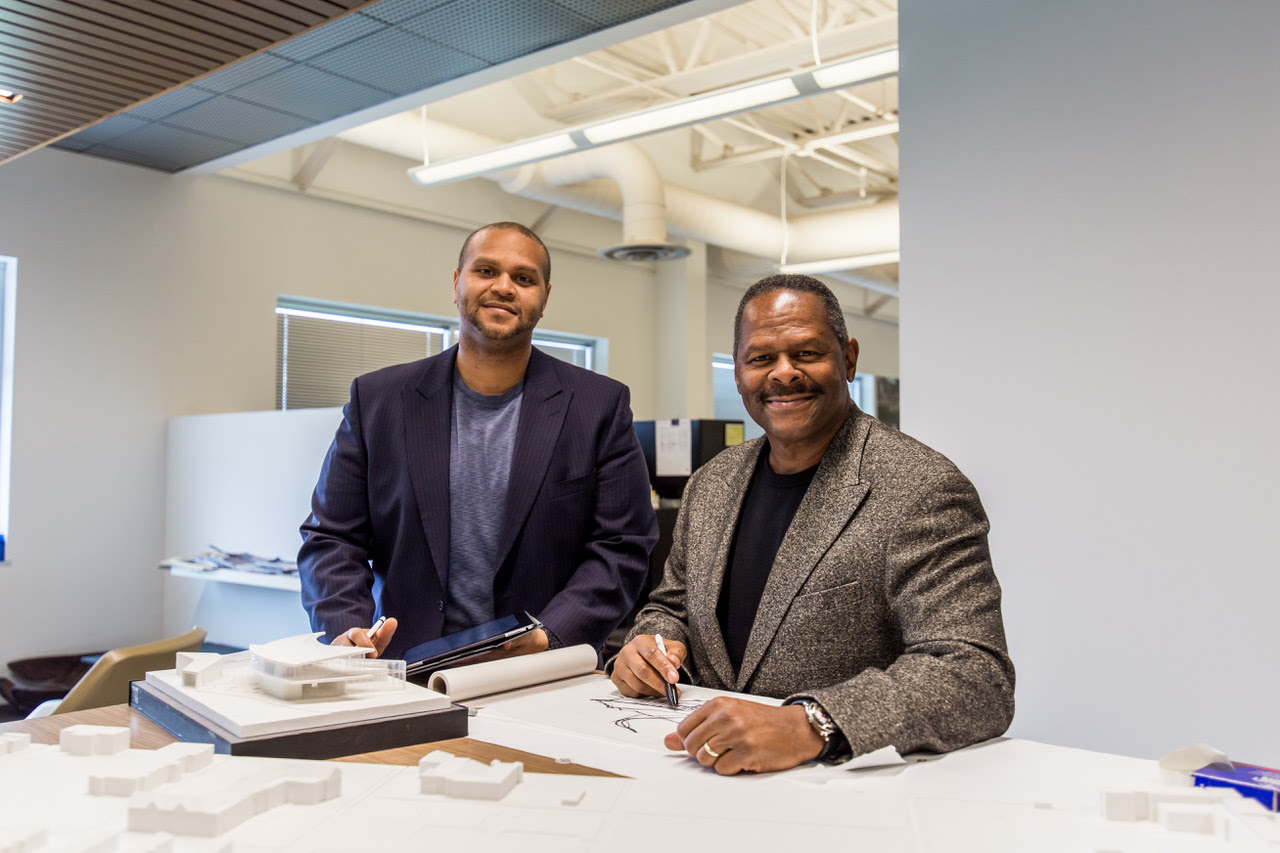COLUMBUS, Ohio - November 21, 2019 – Architectural firm Moody Nolan announced the appointment of Jonathan Moody as its chief executive officer, effective January 1, 2020.
Jonathan Moody has served as president of the Columbus-based firm since 2016, taking day-to-day responsibility for the firm in tandem with his father, CEO and founder Curt Moody. Curt Moody will continue to be fully engaged with the firm as chairman.
Jonathan, an architect, joined the firm in 2011 as a senior associate and was promoted to partner a year later. He was elevated to president three years ago, becoming one of the youngest architectural firm presidents in the United States.
“I am humbled and honored to be named the next CEO of Moody Nolan and look forward to building on the strong foundation established over the past 37 years,” Jonathan Moody said.
Curt Moody, who co-founded the firm in 1982 as a two-person operation, has seen the company grow to 12 offices and become the largest African American-owned architectural firm in the country. As chairman, he will continue to provide active, hands-on leadership and strategic focus.
“I am not stepping away by any means,” Curt Moody said. “But Jonathan has proven himself a highly capable leader, and the time is right to tap the energy and fresh outlook that Jonathan brings to the table.”
Moody Nolan also announced a new four-member Executive Team established to provide a holistic approach to the care and growth of the 12 Moody Nolan offices around the country. While the four Team members will continue in their current project responsibilities, the Team provides a formal structure to facilitate strategic interaction among the firm’s leadership. Executive Team members are:
- Eileen Goodman, Partner and Director of Interior Design now adds Executive Vice President to her title.
- Brian Tibbs, Partner and Director of Nashville Operations now adds Managing Partner to his title.
- David King, Partner and Chief Financial Officer will remain in this position.
- Allen Schaffer, Principal and Director of Sustainable Design, will now divide his time between Sustainable design and his new role of Chief Operating Officer.
“The Executive Team provides a wealth of knowledge and experience that Moody Nolan can leverage when we are confronted with major decisions into the future,” said Jonathan Moody. “Together, we intend to pursue a vision based on growth, impact, design and diversity while respecting and maintaining a culture built over many years.”
About Moody Nolan
Founded in 1982 in Columbus, Ohio, Moody Nolan has grown to encompass 12 cities. In addition to its Columbus headquarters, the firm operates regional offices in Atlanta, Boston, Chicago, Cincinnati, Cleveland, Covington, Dallas, Houston, Nashville, New York City and Washington, D.C. With more than 230 employees, Moody Nolan specializes in corporate, education, sports/recreation, collegiate, healthcare, housing/mixed-use and public service facilities.
More About Jonathan Moody
Education
- 2007-2008 – University of California, Los Angeles, Master of Architecture
- 2002-2007 – Cornell University, Bachelor of Architecture and minor in Africana Studies
Positions Held
- Moody Nolan, Inc., CEO – effective January 2020
- Moody Nolan, Inc., President – January 2016 to present
- Moody Nolan, Inc., Partner – November 2012 to December 2015
- Moody Nolan, Inc., Senior Associate – August 2011
- CannonDesign, Designer – August 2008 to July 2011
- Cornell University, NAAB Archivist – May 2006 to December 2006
- Cornell University, Archival Assistant – June 2006 to August 2006
- Eisenman Architects, Intern – June 2005 to August 2005
- Cornell University, Pre-Freshman Summer Program Advisor – June 2004 to August 2004
- Smoot Construction, Construction Laborer – June 2003 to August 2003 and June 2001 to
August 2001 - Moody Nolan, Inc., Architectural Intern – winters of 2002, 2003, 2004, 2005
Awards
- 2015, AIA Columbus Merit Award: Jonathan’s conceptual design for the Martin Luther King Library won an AIA Columbus Merit Project Award.
- 2010, CannonDesign Ideas Challenges Award: Jonathan was honored with the Ideas Challenge Award, presented by CannonDesign in Los Angeles for innovative project process approach.
- 2007, Alpha Rho Chi Medal for Professionalism: Jonathan received the Alpha Rho Chi Medal, which is offered each year to more than 100 schools of architecture, whose faculty select a graduating senior they feel best exemplifies these qualities. Alpha Rho Chi is the national fraternity for architecture and the allied arts.
- 2006, National Organization of Minority Architects, Student Design Competition: Jonathan won the Student Design Competition sponsored by the National Organization of Minority Architects for a concept design for film school in Queens, New York.
Related Stories
Museums | Aug 11, 2010
Design guidelines for museums, archives, and art storage facilities
This column diagnoses the three most common moisture challenges with museums, archives, and art storage facilities and provides design guidance on how to avoid them.
| Aug 11, 2010
Broadway-style theater headed to Kentucky
One of Kentucky's largest performing arts venues should open in 2011—that's when construction is expected to wrap up on Eastern Kentucky University's Business & Technology Center for Performing Arts. The 93,000-sf Broadway-caliber theater will seat 2,000 audience members and have a 60×24-foot stage proscenium and a fly loft.
| Aug 11, 2010
Citizenship building in Texas targets LEED Silver
The Department of Homeland Security's new U.S. Citizenship and Immigration Services facility in Irving, Texas, was designed by 4240 Architecture and developed by JDL Castle Corporation. The focal point of the two-story, 56,000-sf building is the double-height, glass-walled Ceremony Room where new citizens take the oath.
| Aug 11, 2010
Carpenters' union helping build its own headquarters
The New England Regional Council of Carpenters headquarters in Dorchester, Mass., is taking shape within a 1940s industrial building. The Building Team of ADD Inc., RDK Engineers, Suffolk Construction, and the carpenters' Joint Apprenticeship Training Committee, is giving the old facility a modern makeover by converting the existing two-story structure into a three-story, 75,000-sf, LEED-certif...
| Aug 11, 2010
Utah research facility reflects Native American architecture
A $130 million research facility is being built at University of Utah's Salt Lake City campus. The James L. Sorenson Molecular Biotechnology Building—a USTAR Innovation Center—is being designed by the Atlanta office of Lord Aeck & Sargent, in association with Salt-Lake City-based Architectural Nexus.
| Aug 11, 2010
San Bernardino health center doubles in size
Temecula, Calif.-based EDGE was awarded the contract for California State University San Bernardino's health center renovation and expansion. The two-phase, $4 million project was designed by RSK Associates, San Francisco, and includes an 11,000-sf, tilt-up concrete expansion—which doubles the size of the facility—and site and infrastructure work.
| Aug 11, 2010
Goettsch Partners wins design competition for Soochow Securities HQ in China
Chicago-based Goettsch Partners has been selected to design the Soochow Securities Headquarters, the new office and stock exchange building for Soochow Securities Co. Ltd. The 21-story, 441,300-sf project includes 344,400 sf of office space, an 86,100-sf stock exchange, classrooms, and underground parking.
| Aug 11, 2010
New hospital expands Idaho healthcare options
Ascension Group Architects, Arlington, Texas, is designing a $150 million replacement hospital for Portneuf Medical Center in Pocatello, Idaho. An existing facility will be renovated as part of the project. The new six-story, 320-000-sf complex will house 187 beds, along with an intensive care unit, a cardiovascular care unit, pediatrics, psychiatry, surgical suites, rehabilitation clinic, and ...
| Aug 11, 2010
Colonnade fixes setback problem in Brooklyn condo project
The New York firm Scarano Architects was brought in by the developers of Olive Park condominiums in the Williamsburg section of Brooklyn to bring the facility up to code after frame out was completed. The architects designed colonnades along the building's perimeter to create the 15-foot setback required by the New York City Planning Commission.








